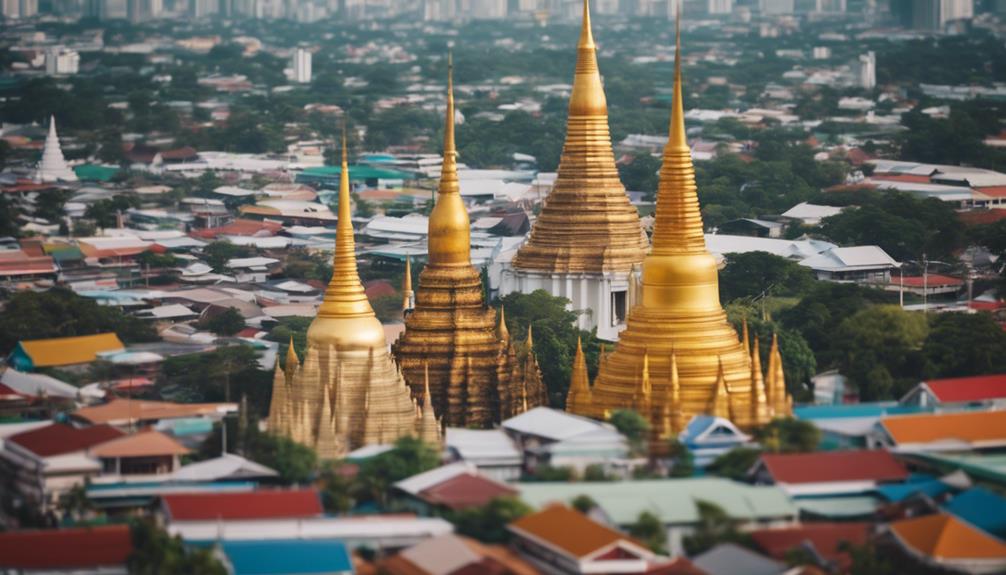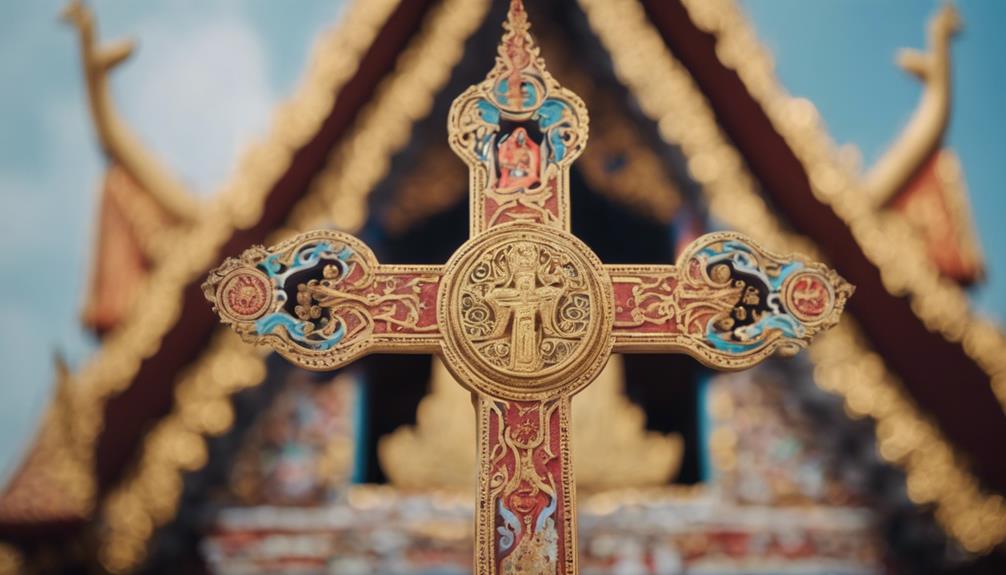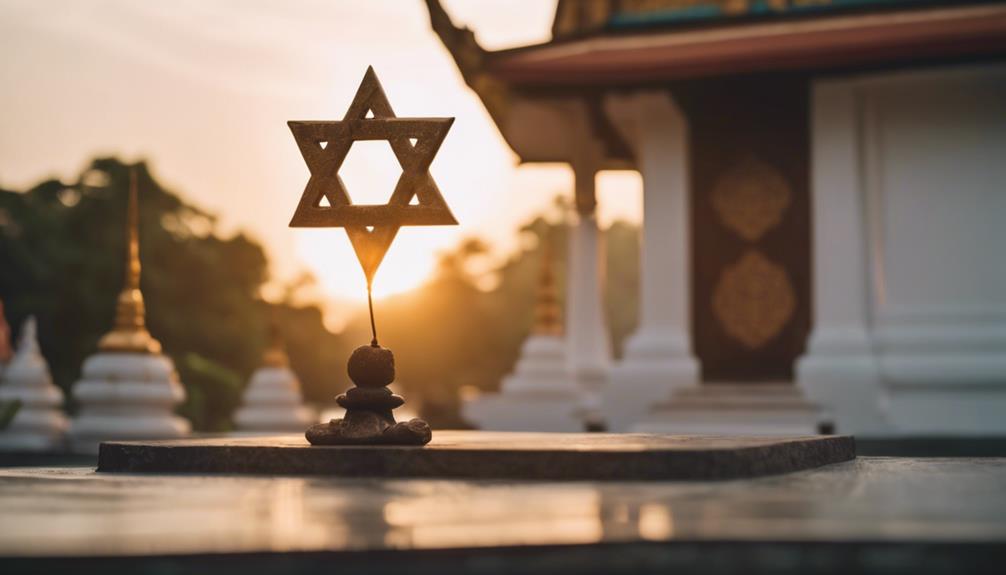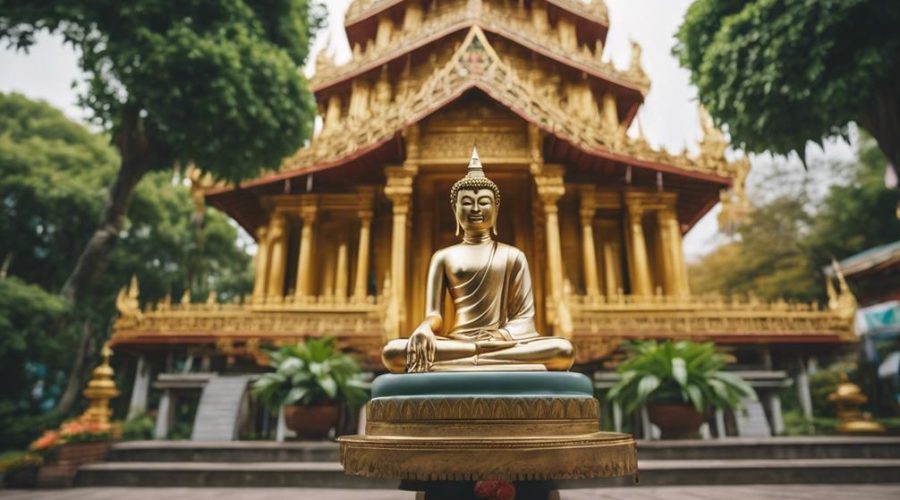What Religion Is the Kingdom of Thailand?
Theravada Buddhism is the dominant religion in the Kingdom of Thailand. It greatly impacts Thai culture, societal norms, and daily life. Although Buddhism is prevalent, Thailand's religious landscape is also characterized by diversity with Islam, Christianity, and ethnic religions coexisting harmoniously. Temples, typically referred to as 'wats,' are essential cultural and religious fixtures that attract millions of tourists annually. To understand the full depth of Thailand's religious fabric and how it weaves into societal and economic structures, further exploration is recommended.
Key Takeaways
- The Kingdom of Thailand's dominant religion is Theravada Buddhism.
- Buddhism significantly shapes Thai culture, values, and daily life.
- Minority religions in Thailand include Islam, Christianity, and various ethnic religions.
- Thailand's religious landscape is diverse, with various belief systems coexisting under the Buddhist umbrella.
- Thailand exemplifies a high degree of religious tolerance, fostering a society where multiple faiths coexist harmoniously.
Overview of Thailand's Religious Landscape

Delving into Thailand's religious landscape, you'll discover a rich tapestry of belief systems, with Buddhism overwhelmingly being the dominant faith. However, it's crucial not to overlook the vibrant diversity that exists beneath this Buddhist umbrella.
Thai Spirituality is a complex amalgamation of influences, incorporating elements from animism, Brahmanism, and ancestor worship. While Thai Buddhism lends itself to a framework of moral and ethical guidelines, these other elements provide a deeply personal, intimate connection to the spiritual domain. It's in this confluence that Thai Spirituality truly comes alive, with each belief system blending seamlessly into the next.
Religious Tourism forms a significant part of Thailand's economy and international appeal. The allure of ancient temples, colorful rituals, and spiritual retreats draw millions of visitors each year. What's more, the innovative ways these religious practices are being adapted to a modern, global context sets Thailand apart. The country's ability to balance preservation and innovation is commendable, providing a fresh perspective on religious tradition.
Dominant Religion in Thailand
While the religious landscape of Thailand is diverse and multifaceted, the predominance of Buddhism is unmistakable, shaping the nation's culture, values, and daily life in profound ways. This dominant religion, specifically Theravada Buddhism, colors every aspect of Thai society, from architecture and art to social hierarchies and governance.
As you explore further, you'll find that the influence of Buddhism extends beyond the spiritual domain, making significant contributions to the economy through religion-based tourism. The magnificent temples, or 'wats', scattered across the country attract millions of tourists each year. This influx of visitors generates substantial revenue, solidifying the role of Buddhism as a key driver of Thailand's economic growth.
In addition, Thai religious rituals, deeply rooted in Buddhist doctrine, are integral to the nation's cultural fabric. Rituals like 'making merit' and 'ordination before marriage' are common practices, underscoring the pervasive influence of Buddhism on Thai society.
In essence, Buddhism isn't just a religion in Thailand; it's a way of life, a philosophy that guides the daily actions and decisions of the Thai people. The dominance of Buddhism in Thailand isn't just statistical, but experiential, impacting societal structures and individual lives alike.
Minority Religions of Thailand

Despite the dominance of Buddhism, you'll find a rich tapestry of minority religions in Thailand, each contributing to the country's diverse spiritual landscape. Ethnic religions in Thailand, such as the tribal practices in the northern highlands, offer a window into centuries-old traditions, often amalgamating animism, ancestor worship, and shamanism. These ethnic religions, while less prevalent, exhibit an intriguing resilience and adaptability.
Religious conversion trends in Thailand also paint an intriguing picture. Islam, for instance, is growing steadily, particularly in the southern provinces. Concentrated among the Malay-Thais, it reflects a vibrant religious pluralism. Christianity, though comprising less than 1% of the population, has found a foothold among various ethnic groups and urban communities. It's important to note the role of societal dynamics, such as education and migration, in shaping these trends.
Notwithstanding the Buddhist majority, the religious tapestry of Thailand is far from monochromatic. The presence and interplay of numerous minority religions underscore a complex, multi-faceted spiritual landscape. This multiplicity not only enriches Thailand's cultural heritage but also broadens our understanding of religious diversity and coexistence.
Influence of Religion on Thai Culture
Religion's impact on Thai culture is profound, shaping everything from art and architecture to social norms and daily rituals. You'll notice a seamless blend of sacred and secular in every facet of Thai life, suggesting an inherent religious influence. Let's explore Thai Rituals Significance and Sacred Symbols Interpretation to understand this interplay better.
Thai rituals, replete with chants, offerings, and dance, exhibit a deeper layer of cultural symbolism. They're not just ceremonial; they're channels for communal bonding and moral education. Take, for instance, the 'Wai Khru' ceremony – a student's tribute to their teacher. It's a ritual that underlines the significance of gratitude, respect, and the teacher-student relationship in Thai culture.
Sacred symbols, too, bear profound interpretations. The lotus, for example, seen in art, architecture, and daily life, is a potent symbol of purity and enlightenment. It's an embodiment of the Buddhist belief in the potential for human transcendence above worldly desires.
In essence, religion in Thailand isn't confined to temples; it's woven into the fabric of daily life, shaping cultural norms, collective consciousness, and societal structures. It's a dynamic, evolving influence, stimulating innovation even in tradition-bound practices.
Religious Tolerance and Freedom in Thailand

Turning our attention to the domain of religious freedom, it's remarkable that Thailand exemplifies a high degree of religious tolerance, fostering a society where multiple faiths coexist harmoniously. This societal harmony doesn't occur magically but is a result of intertwining factors such as Interfaith Dialogues and Religious Legislation.
Interfaith Dialogues, a key part of Thailand's religious landscape, are forums where representatives of different faiths engage in conversation, promoting understanding and reducing potential conflicts. These dialogues enable you to appreciate the intricacies of the religious diversity in Thailand, showcasing the nation's innovative approach to fostering religious cohesion.
Simultaneously, Thailand's Religious Legislation plays a significant role in maintaining this equilibrium. It upholds the freedom of belief and worship for all, permitting the practice of Buddhism, Islam, Christianity, Hinduism, and other faiths. It's the legal framework that safeguards the rights of religious minorities, ensuring their protection against potential discrimination or persecution.



